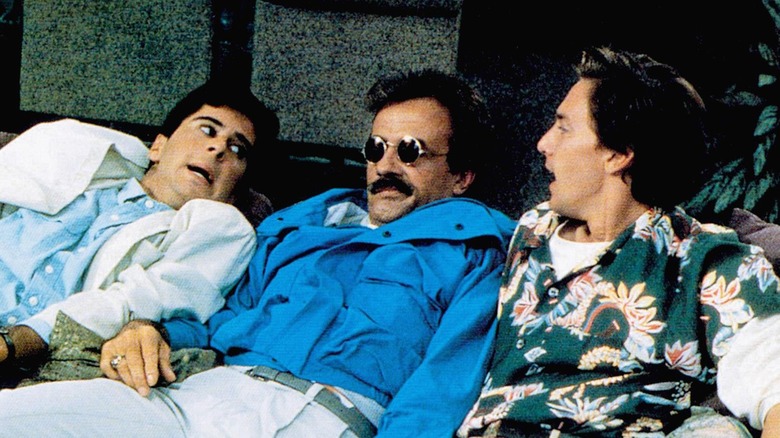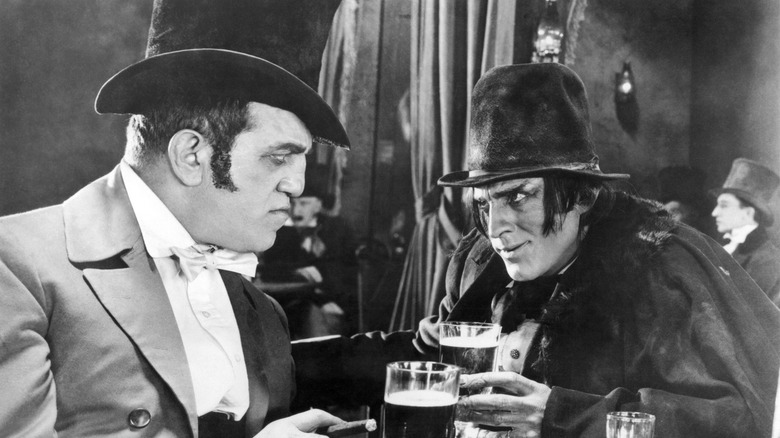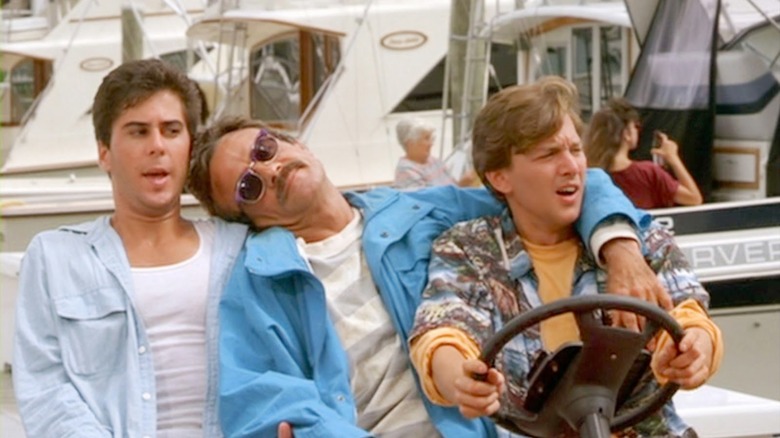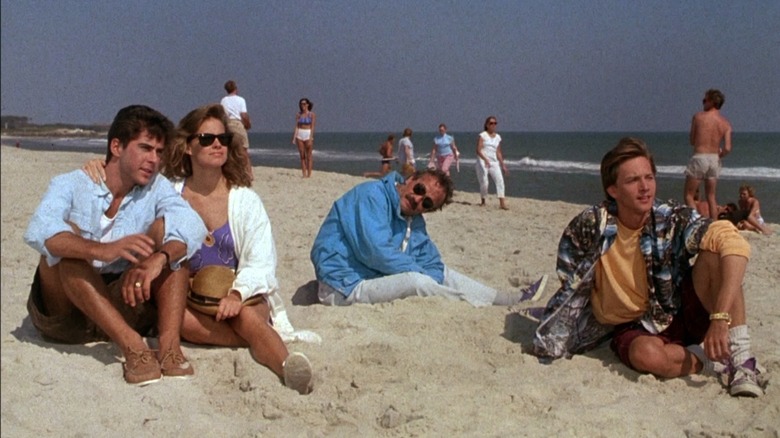Did A Ghoulish Prank Involving Drew Barrymore's Dead Granddad Inspire Weekend At Bernie's?
It's only natural that a place as storied as Hollywood has its fair share of myths and urban legends, and Tinseltown has produced some real blockbusters over the years. There is the debunked rumor that one of the actors playing a Munchkin took his own life on the set of "The Wizard of Oz" and can be seen swinging from a tree in one scene; or the claim that Walt Disney is cryogenically frozen beneath the "Pirates of the Caribbean" attraction at Disneyland; or the sadly true tale of actress Peg Entwistle, who leapt to her death from the Hollywood sign.
One of the strangest of these Hollywood urban legends involves Drew Barrymore's grandfather, John Barrymore. The actor was one of the big stars of early Hollywood, famous for his roles in "Dr. Jekyll and Mr. Hyde" and "Grand Hotel." He was also a heavy drinker, hellraiser, and member of the Bundy Drive Boys, a group of over-the-hill artists and boozers who gathered to make merry, which also included W.C. Fields, Errol Fynn, Sadakichi Hartmann, and John Decker. Gene Fowler, a journalist who was also a member, wrote (via LA Times):
That brown beamed studio was a place of meeting for still-lively survivors of Bohemian times, an artists' Alamo where political bores never intruded and where breast-beating hypocrites could find no listeners .... These men lived intensely, as do children and poets and jaguars.
It sounds like a blast, but not the kind of company who would let you skip a party. Not even if you were dead.
The strange tale of the partying corpse
John Barrymore passed away on 29 May 1942, aged 60, of cirrhosis of the liver and kidney failure caused by his heavy drinking. The urban legend tells that some of his friends from Bundy Drive decided to give him a little send-off, after the fact.
The earliest version of the story emerged in Errol Flynn's autobiography in 1959, claiming that director Raoul Walsh and his friends bribed a mortuary attendant $200 to "borrow" Barrymore's body for an hour. They took the corpse to Flynn's house and propped "Jack" up in a chair. He recalled:
As I opened the door I pressed the button. The lights went on and my God – I stared into the face of Barrymore! His eyes were closed. He looked puffed, white, bloodless. They hadn't embalmed him yet.
I let out a delirious scream.
Years later, Raoul Walsh corroborated the story in his own memoir. Perhaps understandably, his version was more light-hearted than Flynn's:
The two of us had a hard time propping Jack up on the couch. Alex [Flynn's butler] said again Mr Barrymore looked terrible, but I insisted that he was just plain dead drunk. I told him to pour Mr Barrymore a drink, as it might help to bring him to. Alex did so and put the drink on the coffee table. I then told Alex to make him some hot coffee, which might help bring him to, and Alex proceeded to the kitchen.
It sounds just like a scene right out of the movie "Weekend at Bernie's."
So what happens in Weekend in Bernie's again?
Larry (Andrew McCarthy) and Richard (Johnathan Silverman) are two dorky employees at a big New York insurance company. They discover a discrepancy in the reports and think that it will be their leg-up in the company, informing their loathsome CEO, Bernie Lomax (Terry Kiser). Bernie offers his thanks by inviting them out to his house in the Hamptons for the weekend.
Unbeknown to them, Bernie committed the fraud himself and arranges with a mob boss to have Larry and Richard whacked. It's agreed, but since Bernie is sleeping with the boss's girlfriend, they send a hitman to kill him instead. The boys arrive at the plush beach house just after Bernie is murdered, looking forward to a long weekend of top-notch food, drink, and parties.
At first they're gutted that Bernie was inconsiderate enough to die on them, ruining all the fun. But when Bernie's friends arrive and don't notice he's dead, Larry persuades Richard to keep up the ruse and pretend Bernie is still the life of the party.
I had fond memories of "Weekend at Bernie's," but it hasn't aged well. It's hard to believe it comes from Ted Kotcheff, the director of "Wake in Fright" and "First Blood." It takes almost 40 minutes of tired banter and generic romance before the boys even realize Bernie is dead. The film's major saving grace is Kiser as Bernie, pulling off some inspired slapstick as the hapless stiff and blowing away McCarthy and Silverman without moving or saying a word.
Did the legend inspire Weekend at Bernie's?
In 2020, Drew Barrymore confirmed the story about her grandfather's excursion from the morgue on "Hot Ones." When asked if it was true, she said:
"Not only yes, but there have been cinematic representations of that. A Blake Edwards film called 'S.O.B' that's just brilliant and fun to watch no matter what, and then I've heard things about 'Weekend at Bernie's.' I can't know, ever, if that's even true, but yes, they did. And I will say this: I hope my friends do the same for me. That is the kind of spirit I can get behind, just prop the old bag up, let's have a few last rounds."
That would seems to close the matter, but then there is the story of Gene Fowler, another Bundy Boy who held an all-night vigil beside Barrymore's body and saw no-one absconding with the corpse. According to Barrymore's biographer, the only other visitor that night was a sex worker paying her last respects.
So while Barrymore enthusiastically embraces the urban legend, it is just possible her granddad never left the morgue for his final send off. She later asked Andrew McCarthy if he knew whether the story inspired "Weekend at Bernie's." He said:
"That could well have been true, but we do not have such a fine pedigree as that. We were just fools running around with this dead body."
While "Bernie's" screenwriter Robert Klane may have heard the legend, two more traditional sources are often cited: a 1959 Brazilian novella called "The Two Deaths of Quincas Wateryell" and the 1983 Hindi film "Jaane Bhi Do Yaaro," which both share a similar premise. Since the book came out the same year as Flynn's memoir, is it possible one influenced the other?



